facialrecognition
Latest
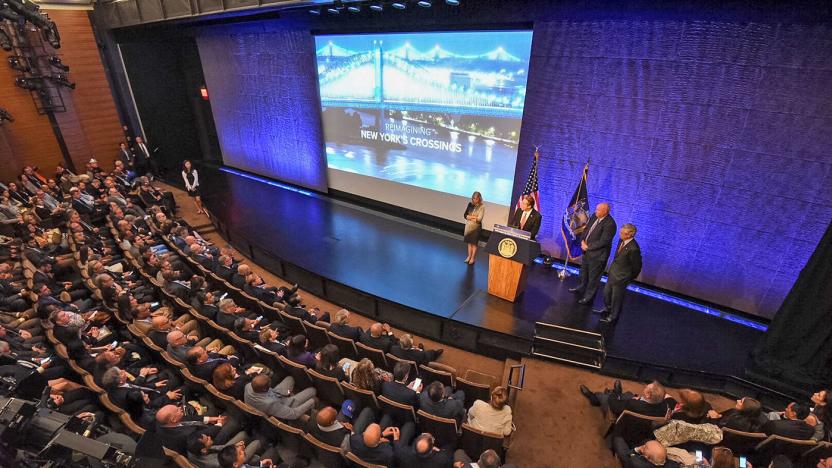
New York will use facial recognition to catch terrorists
New York governor Andrew Cuomo wants to give the state's bridges and tunnels a high-tech makeover, starting with the installation of cameras, sensors and facial recognition equipment. Under his initiative, crossings, airports and other strategic locations will be equipped with facial recognition systems as an anti-terrorism measure. Facial recognition still isn't perfect and has issues recognizing people of color*, but the state does have some experience with the technology. Its DMV, for instance, uses a facial recognition system that has led to over a hundred arrests since it was upgraded in January this year.

Facial recognition will find your disappointing sex-cam double
Using your face to unlock your smartphone, or seeing Google or Facebook's algorithms identify your friends and family proves that facial recognition tech can be useful. But where there's a will, there's a way to... repurpose technology for the adult entertainment industry. On webcam show hub Megacams, you can upload a picture of yourself and it uses machine-learning facial recognition magic to find your sex-cam lookalike. I'm not sure why you're looking for someone that's pleasing themselves on camera when they look just like you. Regardless, the technology is here -- although the site is (obviously) not at all safe for work-time browsing. I warned you.
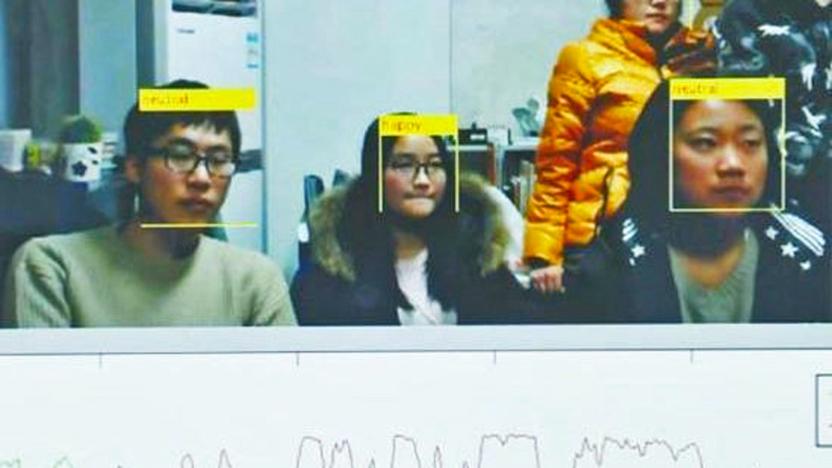
Professor uses facial recognition to spot bored students
If you've been to college or university, you'll know the feeling: when your professor drones on for hours on end, but you're hesitant to bring it up out of politeness (or fear of said professor's wrath). You won't have to be quite so shy in Wei Xiaoyong's science classes, though. The Sichuan University educator is using a custom-built facial recognition system to scan students' faces and determine whether or not they're bored. The approach gauges the emotion in your face over time, helping Wei refine his lectures so that he doesn't lose your interest.
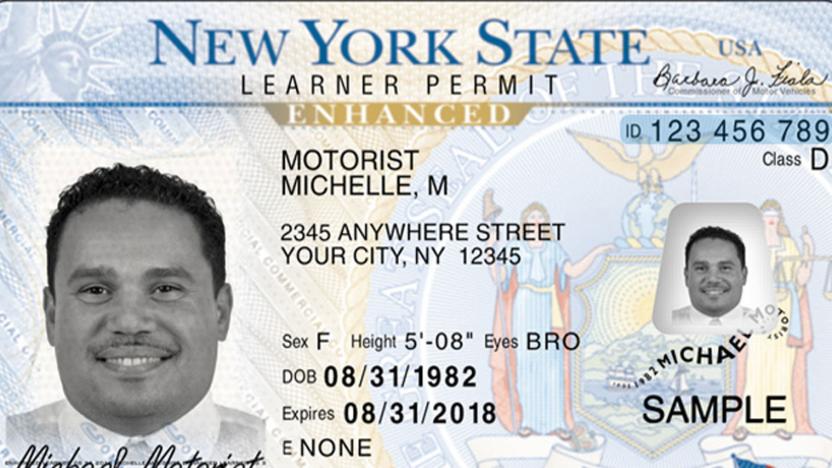
New York's smarter face recognition catches more ID thieves
Sometimes, behind-the-scenes tech upgrades can make a big difference. New York's Governor Cuomo reports that an overhaul of the state DMV's face recognition software in January has led to more than 100 arrests and 900 open investigations so far. The trick? The new system checks 128 points on a face instead of 64, dramatically increasing the chances that it'll match a photo against the DMV's database. Combine that with new comparison modes (like black-and-white and overlays) and it's easier to catch identity thieves and fraudsters, such as one man who tried to get a license with a stolen identity in order to evade a suspension.

3D faces based on Facebook photos can fool security systems
Facial recognition systems aren't quite perfect yet and can still make mistakes especially when they're assessing the faces of people of color. Now, a team of researchers from the University of North Carolina showed that companies developing security systems based on the tech really do have a lot of work ahead of them. They proved that a number of existing systems can be fooled by the VR-like, computer-rendered faces they created. Further, they made their 3D models, which they showed the security systems on a phone, using only photos taken from social networks like Facebook.

FBI's facial recognition system can access 411 million photos
When we first wrote about the FBI's Next Generation Identification (NGI) facial recognition system, we said the agency has access to 70 million photos. Turns out the feds can sift through tons more images than that. The US Government Accountability Office (GAO) has discovered that the FBI actually has access to 411.9 million pictures of Americans and foreigners alike, most of whom have no prior criminal records. FACE can look through NGI's collection, as well through biometric databases ran by the DOJ and 16 different states. It can also search the State Department's passport and visa application records for possible matches.

FBI chiefs want databases exempt from privacy protections
The FBI has hatched a plan to prevent its colossal database of fingerprints and mugshots from falling under the auspices of the Privacy Act. The bureau wants a series of exemptions from the law, including the requirement to tell people, when asked, that they're listed on the system. The feds also want to remove the requirement for people listed on the database to be able to correct any errors in their file. Naturally, the EFF and 44 other privacy groups have protested the move, sending a letter to the Department of Justice asking for an extension on the 21-day consultation period to debate the issue properly.

Facebook respects European privacy, skips facial recognition
Last June, Facebook launched an app called Moments that allows you to share event photos with friends. The software uses facial recognition to who's in the pictures for easy tagging and organizing. In the EU, regulators had already taken Facebook to task over its "tag suggest" facial recognition feature that scanned photos for your friends so you could easily tag them on the site. European data authorities haven't changed their stance on the feature, so Moments wasn't available there or in Canada until now.
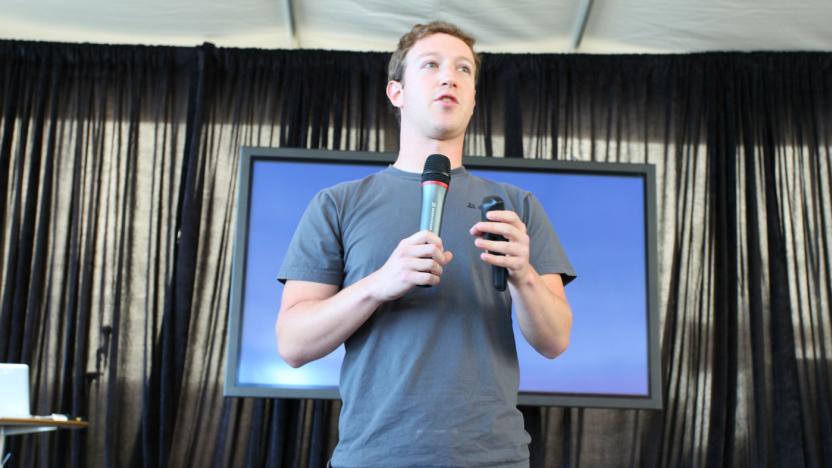
Facebook can't stop lawsuit over its facial recognition software
Facebook will have to battle it out in court over a lawsuit that claims the social network's facial recognition software violates an Illinois privacy act. This week, a San Fransisco federal judge denied Facebook's motion to dismiss the case. The suit alleges that Facebook's facial recognition and photo-tagging system violates Illinois' 2008 Biometric Information Privacy Act, which states that companies must receive explicit consent to collect identifiers including fingerprints and, in this case, faceprints.

Apple buys AI firm that detects emotions in facial cues
If it wasn't already clear that Apple is getting serious about artificial intelligence, it is now. The company has confirmed that it bought Emotient, a fledgling outfit that uses AI to gauge emotions based on facial expressions. As usual, the Cupertino crew isn't saying what its plans are. However, Emotient's specialty is in detecting your overall sentiment, like contentedness or frustration. Combined with the AI-powered assistant tech from VocalIQ, it wouldn't be shocking if Apple is working on helper software that genuinely understands your moods and reactions. There's certainly pressure to do so -- with both Facebook and Google working on AI-driven chat assistants, Apple might not want to feel left out. [Image credit: Getty Images]

These are the first third-party Windows Hello cameras
Microsoft's Windows 10 computers have a log in feature called Windows Hello, where users are able to access their devices using facial recognition algorithms. On the downside, the feature was only available on newer devices with depth-sensing cameras built-in. That is, until eye-tracking company Tobii decided to change things up by offering support for the service with its standalone cameras.

Watch a human face emerge from a bunch of overlain, inanimate objects
As the brain attempts to organize the visual world, it hones in on familiar patterns -- like the shape of a human face -- and sometimes, it even concocts these patterns out of random noise. We spot faces in all sorts of inanimate objects, from grilled cheese to buildings to coffee makers. Some objects are even designed with the human face in mind, at times to a creepy degree, as artist Robby Kraft found. Kraft used face-detection tech from Kyle McDonald (on GitHub) to overlay about 67 images of human faces found in the #selfie tag on Instagram; these created an "average" human face after about 15 images (above, left). He ran about 125 inanimate objects tagged #FacesInThings through the same software and, again after just 15 images, an eerily "average" human face emerged from the compilation (above, right).

Computers learn how to spot hidden facial expressions
Machines are good at spotting obvious emotions like smiles, but they're not so hot at detecting the extremely brief microexpressions that reveal when people are covering up their true feelings. They may have a keener eye in the future, though: researchers have developed a computer vision algorithm that magnifies facial expressions, making it possible to catch the tiniest bit of displeasure or surprise. While some humans have a knack for spotting these subtle cues, the algorithm is far more effective in early tests -- you likely wouldn't fool the computer into thinking everything was hunky dory.

Windows 10's face detection isn't easily fooled by twins
Windows 10's facial recognition is supposed to make it easy to sign into your PC while maintaining security, but just how good is it? Good enough that even your doppelganger might not get in, apparently. The Australian has conducted an informal test where it tried to fool Windows using sets of identical twins, and the software wasn't tricked once -- it had a problem logging in both twins in one instance, but it otherwise allowed only those individuals that had set up recognition in the first place. That was true even when the 'evil' twins attempted to spoof the camera by adjusting their hair or removing their glasses.

MasterCard is testing a new way for you to pay with your face
MasterCard announced on Thursday that it's looking to add a layer of biometric security to its credit cards and all user will need to do is simply take a selfie. The system will create a digitized map of your face, convert that map into a hash and compare it to the hash stored on Mastercard's servers. Users will be able to pay through a mobile app with either their fingerprints or by staring into the device and blinking once. The blink is used to prevent someone from just holding up a picture of you to spoof the system. What's more, "They're storing an algorithm, not a picture of you," Phillip Dunkelberger, who runs Nok Nok Labs, told CNN Money. "And I'm sure they're doing the appropriate stuff to guard it."
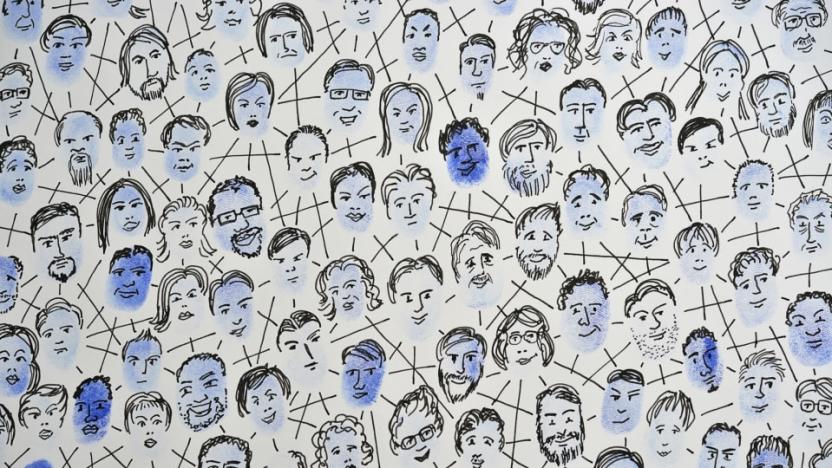
Face-tracking tech knows when you skip church services
More than two dozen churches around the world have installed a facial-recognition system that monitors which members of the flock have actually shown up for the Sunday sermon. The system is called Churchix and was developed by Israeli software company, Face-six. It continually scans the religious center's CCTV feed and matches congregation members to a pre-existing database of their faces -- reportedly with 99 percent accuracy.

Facebook algorithm can recognize people if it can't see their face
A number of companies have developed photo software for facial recognition, but what happens when your face is partially hidden? What if it's completely covered up? Facebook's artificial intelligence lab developed an algorithm that remedies the issue by picking out folks with other clues. Instead of using facial features, the software can identify people using things like hair style, pose, clothing and body type. Of course, a tool like this could lend a hand in a photo app like Facebook Moments or even Google's revamped Photos software. However, it also raises privacy questions when you can be identified in a snapshot even if your face is concealed, especially if you're trying to remain hidden on purpose. Facebook's algorithm is pretty good too, identifying people with an 83 percent success rate in tests, so we'll be curious to see if it makes its way into the social network's photo galleries in the future. [Image credit: David Paul Morris/Bloomberg via Getty Images]

Hey ladies, this German billboard wants to sell you a beer
Here in America, women are far more likely to be featured in a beer commercial than actually targeted by one. However in Germany, Astra brand beer is focusing specifically on female drinkers with an unusual and automated billboard that speaks only to them. Developed by the Philipp und Keuntje ad agency and starring German comic star Uke Bosse, these billboards will only activate when women pass by. Each electronic sign is outfitted with a small camera and loaded with cutting-edge "gender detection" software that not only differentiates between the sexes, it also accurately judges their age. Once a lady does pass Bosse's gaze, the ad will activate and automatically play one of 70 pre-recorded snippets. However, when a man walks by, he's told to keep on steppin'. Check out the billboard in action below.

Microsoft's age-guessing tech highlights effects of homelessness
Microsoft's how-old.net isn't the most reliable age detecting software. The company set it up as a demo site and never expected it to go viral (two million shares on Facebook). While thousands of users checked in to see how old an algorithm thinks they are, Toronto's Covenant House used the social tool as a catalyst for a pressing cause. They created a web ad that shows Cale, a 22-year-old homeless man, stamped as a 43-year-old on how-old.net. "The message was simple: living on the streets robs kids of their youth," Josie do Rego, Director of Development and Communications, told Engadget. "We wanted to remind people that the streets are no place for young people."

Students design a facial recognition cane for blind people
Facial recognition technology has many use cases, but none nearly as significant as this next one might be. A group of students at Birmingham City University are developing a smart cane, dubbed XploR, which uses a combination of hardware and software to help the visually impaired easily identity family and friends. The device is powered by a smartphone's face recognition features, GPS and Bluetooth, allowing blind people who use it to detect faces up to roughly 33ft away. If the cane does recognize someone, it then sends a vibrating signal to the person and guides them via an ear piece -- for reference, the images of loved ones can be stored on an SD card.









